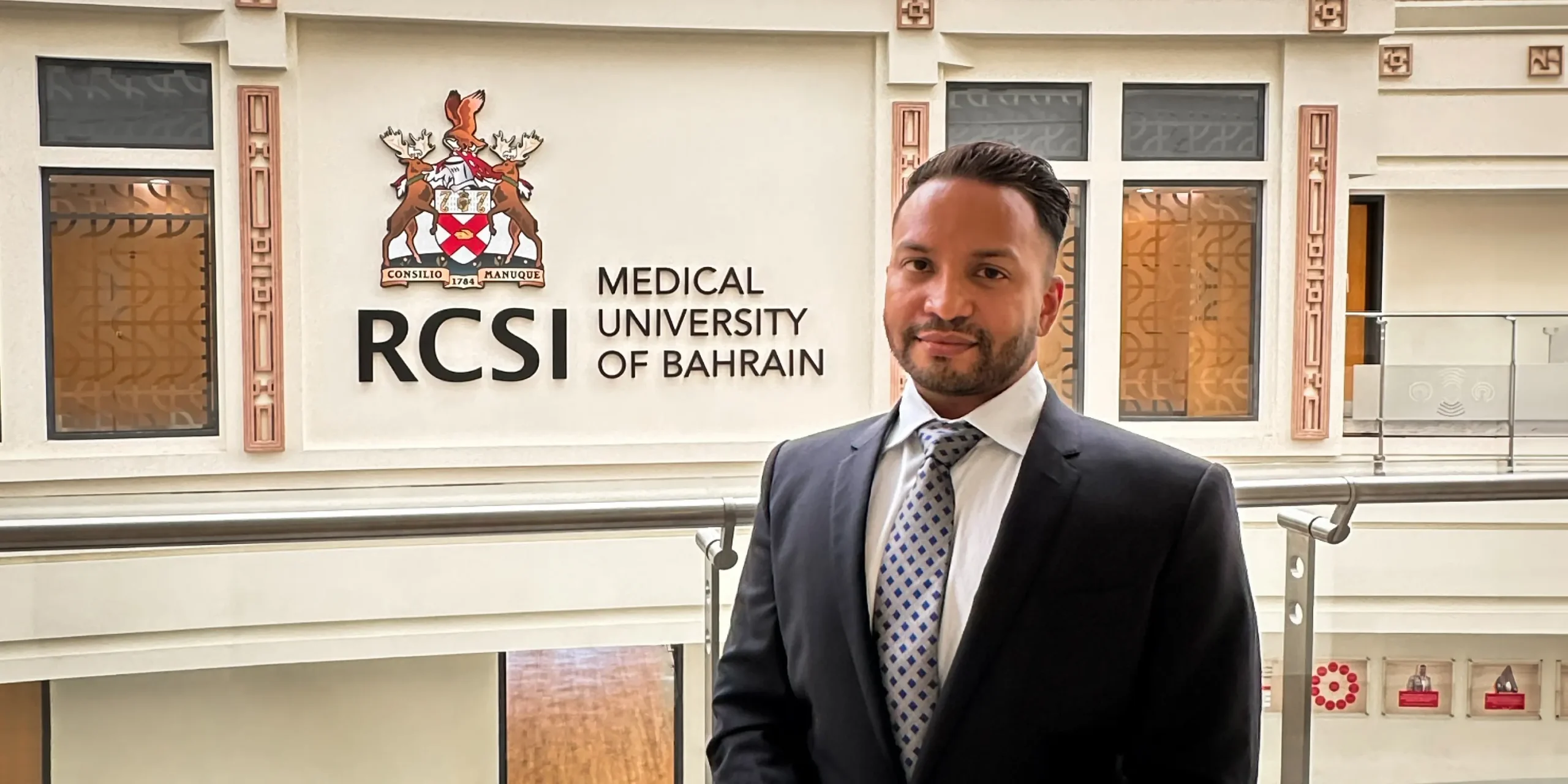An interview with Sultan Muhammad
How is the Royal College of Surgeons in Ireland (RCSI) Medical University of Bahrain driving innovation? We spoke to Sultan Muhammad to find out.
Introducing RCSI Bahrain
RCSI Bahrain, a constituent university of the Royal College of Surgeons in Ireland, is an independent private, not-for-profit health sciences institution with a mission to improve health outcomes both locally and globally by fostering excellence in education, research, and service.
Now celebrating its twentieth anniversary, it offers undergraduate and postgraduate programmes across three faculties (Medicine; Nursing and Midwifery; and Postgraduate Studies and Research), welcoming a diverse student body comprising 40 nationalities.
Meet Sultan
Sultan has been at RCSI Bahrain since 2012, starting at a junior level and progressing to his current role as Senior Administrator to the School of Nursing and Midwifery.
He explains that his job “encompasses a broad range of responsibilities aimed at enhancing the operational efficiency and academic success of the School”. This includes managing academic schedules, plus ensuring compliance with internal policies and external accreditations.
In addition, Sultan has completed an MSc in Big Data Analytics from Wrexham University in Wales, building on his prior experience as a research analyst. He finds this expertise is invaluable when analysing educational data to support data-driven decision-making at RCSI Bahrain.

Supporting students
“Our students are committed to achieving excellence in their studies,” comments Sultan, “and are driven by a strong desire to contribute to different healthcare sectors, both in Bahrain and internationally”.
Thus, RCSI Bahrain has a multifaceted, tailored approach to student support, including personal tutoring, mentorship programmes and wellness services, as well as academic guidance. Sultan describes their ethos as follows: “what is the most practical and beneficial for an individual student’s success?”
A big part of their strategy involves leveraging data analytics to identify students who are potentially at risk of underperforming academically, or even withdrawing from their programme of study. This enables the institution to facilitate early intervention by the relevant support services, getting students back on track to successfully complete their studies.
Utilising data
As a Kortext partner, this includes data gleaned from our analytics dashboard. Sultan explains that each student receives Kortext eTextbooks throughout the BSc (Hons) Nursing programme in the School of Nursing & Midwifery.
As the eBooks Project Manager within the School of Nursing & Midwifery, he has administrative access enabling him to assess students’ engagement with the eBooks. This information is “critical”. He elaborates, “for example, if a module uses the Fundamentals of Nursing eBook, through that we can identify if a student’s study hours are low, which often matches with their progress if they’re not using the text that has been provided to them”.
Following this, Sultan would arrange to meet with the student and the academics in the School to establish whether the student needs additional support. He says, “if they do, we can help in various ways and that turns out to be very beneficial for the student and the staff too”.
“During my educational journey, I have witnessed first-hand how data can be used to enhance student engagement and improve retention rates,” he adds, “as analytics enable us to identify patterns and trends in student performance, predict potential challenges and implement timely intervention”.
Further, Sultan sees big data analytics as “a powerful tool for advancing higher education”. This could be used for curriculum development, to “predict and optimise resource allocations”, and to “support personalised learning experiences by providing insight into individual preferences”.

Leveraging generative AI
RCSI Bahrain is embracing the capabilities of generative AI, with a university AI committee overseeing the implementation and ethical use of these tools to enhance learning and teaching.
“AI can streamline processes such as student support services,” says Sultan, “and we’re also exploring the integration of generative AI to augment our educational strategies, ensuring we remain at the forefront of innovation and continue to provide top-tier education”.
Further, generative AI is opening up exciting opportunities for researchers too. Sultan is involved with research projects at RCSI Bahrain and he shares how, when reviewing academic literature, “I can use generative AI to identify key insights that would not be apparent to the human eye”.
As a result, generative AI has reduced the work of reviewing multiple academic research papers from several days to a few minutes, enabling researchers to “focus our time and energy on going deeper into the research”. However, Sultan stresses the importance of fact-checking “information that might have been hallucinated by generative AI – that’s when human intelligence is irreplaceable”.
Centrality of students
While excited by the huge potential for big data analytics and generative AI in higher education, Sultan remains focused on student support and success. As a final point, he says “our students and alumni are making a huge impact in Bahrain and internationally, and we are very proud of them”.
To find out more about how Kortext is pioneering digital innovation in partnership with institutions worldwide, talk to us today.






